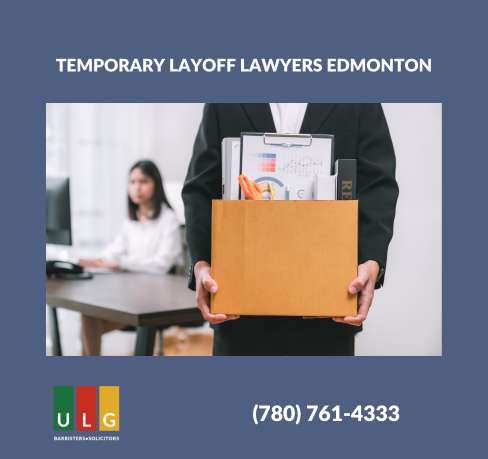Temporary layoffs are a significant aspect of employment law in Alberta, and understanding the implications can be crucial for both employees and employers, especially in Edmonton’s fluctuating economic landscape. Here, we will explore what temporary layoffs mean in Alberta, including rights, limitations, and potential issues, as well as how a law firm like Ulasi Law Group in Edmonton can provide guidance and support through this complex process.
What is a Temporary Layoff?
A temporary layoff occurs when an employer suspends an employee’s work due to economic or business needs, with the intention of potentially resuming their employment at a later date. This differs from a permanent layoff or termination, where the employment relationship is intended to end completely.
In Alberta, temporary layoffs are governed by the Employment Standards Code. Under this legislation, employers have the right to impose temporary layoffs in specific circumstances, but they must adhere to strict rules and time limits. For instance:
- Duration Limits: As of 2023, Alberta’s legislation allows for a temporary layoff to last a maximum of 90 consecutive days within a 120-day period.
- Employer’s Obligation: If the layoff exceeds this period, the layoff becomes a termination, and the employer is then required to provide termination pay or notice as stipulated in the Employment Standards Code.
- Notice Requirements: Employers must provide employees with written notice of the layoff, stating the layoff’s effective date and the anticipated duration.
Rights of Employees During a Temporary Layoff
While employees are not entitled to regular wages during a temporary layoff, they are still considered employees and may retain certain benefits, such as health benefits, unless explicitly stated otherwise. If an employer does not adhere to the Employment Standards Code’s requirements during the layoff, this could result in a wrongful dismissal claim or an entitlement to termination pay.
Additionally, employees should understand that they have certain rights, including:
- Severance Pay: If the temporary layoff becomes a termination after 90 days, employees may be entitled to termination or severance pay.
- Job Protection: During the temporary layoff period, an employee’s position cannot be permanently filled, as it is intended that they will return to their role.
- EI Benefits: Employees who are laid off temporarily may be eligible for Employment Insurance (EI) benefits, providing them with income support until they are recalled or find alternative employment.
Challenges with Temporary Layoffs
Temporary layoffs can be beneficial for employers as they provide flexibility and allow for cost-cutting during economic downturns. However, the practice can also present several challenges:
- Lack of Job Security for Employees: The uncertainty of a temporary layoff can be stressful for employees, as they are left waiting without an assurance of returning to their previous job.
- Employer Risks: Employers may inadvertently turn a temporary layoff into a termination if they exceed the 90-day limit, risking legal claims for wrongful dismissal or severance pay.
- Union Considerations: In unionized environments, temporary layoffs are often subject to the terms outlined in a collective bargaining agreement, which can impose additional restrictions and obligations on the employer.
Ulasi Law Group’s Assistance with Temporary Layoffs
Ulasi Law Group, a law firm based in Edmonton, Alberta, offers expertise in employment law, including issues surrounding temporary layoffs. Whether representing an employee or an employer, they provide a thorough understanding of Alberta’s Employment Standards Code and can offer tailored guidance. Here’s how they can help:
- Advice on Legal Rights and Obligations: For employees facing temporary layoffs, Ulasi Law Group can provide a clear picture of their rights, including severance entitlements, potential claims for wrongful dismissal, and eligibility for benefits. They help ensure that employees are not unfairly treated and are aware of all their options during a layoff period.
- Assistance for Employers: For employers, Ulasi Law Group can advise on how to conduct a temporary layoff in compliance with Alberta’s Employment Standards Code. They can provide guidance on preparing proper notice, managing employee benefits, and establishing a compliant layoff policy. Their goal is to help employers minimize legal risks and avoid unintentional wrongful termination claims.
- Navigating Legal Disputes: If disputes arise during or after a temporary layoff, such as an employee seeking termination pay or alleging wrongful dismissal, Ulasi Law Group has experienced employment lawyers who can mediate, negotiate, or represent the client in court. They work to achieve resolutions that meet their client’s objectives, whether that involves compensation or reinstatement.
- Supporting Unionized Employees and Employers: For clients in unionized workplaces, Ulasi Law Group can provide support with union-related matters, ensuring that the layoff process aligns with the collective bargaining agreement and helping resolve disputes if they arise.
- Representation in Layoff Extensions or Terminations: When temporary layoffs are extended or converted into terminations, Ulasi Law Group can ensure that the transition is legally compliant and that employees receive the compensation they are entitled to under the law. For employers, they can advise on the best practices to manage these transitions while limiting liability.
- Advocacy for Employees Facing Unfair Treatment: For employees who believe they were unfairly selected for a temporary layoff or that their employer is not upholding layoff regulations, Ulasi Law Group can advocate on their behalf, helping them pursue fair treatment or compensation for unjust practices.
Important Considerations for Employers and Employees
To avoid legal issues and misunderstandings, both parties involved in a temporary layoff should take proactive steps:
- Document Everything: Employers should document all communications related to the layoff, including the notice, reasons for the layoff, and any agreements regarding employee benefits. This documentation can provide crucial evidence in case of a dispute.
- Understand Termination Pay and Severance: Both employers and employees should know the potential financial implications if a temporary layoff extends beyond the legal limit. Being clear on these points can prevent costly misunderstandings.
- Be Aware of Alternative Work Options: In some cases, employees may find alternative work or employers may offer reduced hours instead of a temporary layoff. Discussing these options can sometimes be mutually beneficial.
How to Get Started with Ulasi Law Group
If you are an employer or employee facing challenges with a temporary layoff, consulting with a law firm like Ulasi Law Group can be a wise decision. They provide consultations to help you understand the process and potential outcomes, offering solutions that are specific to your needs.
In addition, they can offer guidance on related employment issues, such as termination for cause, wrongful dismissal claims, and disputes involving benefits and entitlements, making them a valuable resource for both proactive planning and reactive support.
Conclusion
Temporary layoffs in Edmonton, Alberta, are a critical component of the employment landscape, particularly during economic uncertainties. While they can provide temporary relief for businesses, they also raise numerous legal considerations and risks that can impact both employers and employees. With the guidance of an employment law firm like Ulasi Law Group, individuals and businesses can navigate these complexities, ensuring compliance with Alberta’s Employment Standards Code and protecting their rights and interests in a temporary layoff situation.

